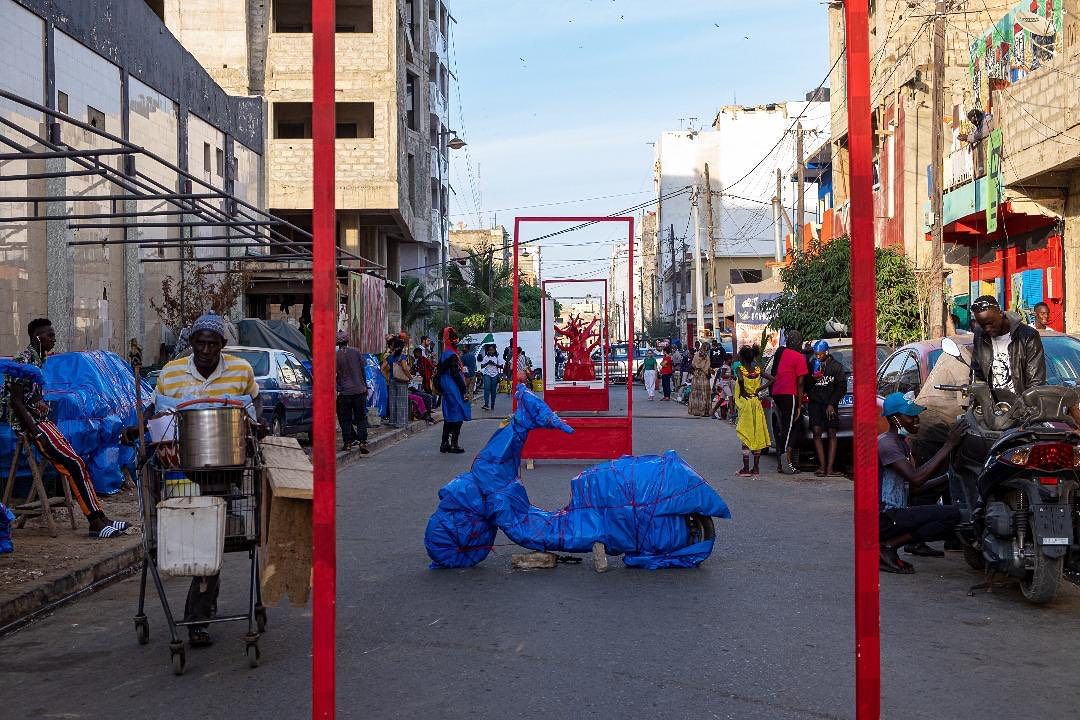Inspiration #1: Laboratoire Agit’Art, El Hadji Sy & Aisha Dème

“El Hadji Sy is our reference. An incredible artist, deeply committed. He pioneered collective thinking in Dakar, notably through Laboratoire Agit’art – which he co-created with Issa Samb, Djibril Diop Mambéty and Youssoupha Dione – a sanctuary where artists freely express themselves. Today, thanks to them, our artistic expression knows no bounds. They liberated art’s voice.” Aisha Dème 🖋️
El Hadji Sy, born in 1954 in Senegal, is a prominent figure in the movement following Léopold Sédar Senghor’s Négritude ideology¹. Sy’s contributions to art, activism, and cultural intervention have significantly influenced contemporary African expression.
El Hadji Sy co-founded Laboratoire Agit’Art in 1974 with the artist Issa Samb (also known as Joe Ouakam), the filmmaker Djibril Diop Mambéty, and the playwright Youssoupha Dione. This collective challenged the status quo of artistic expression and socio-political norms in post-colonial Africa, encouraging artists to adopt critical perspectives. Issa Samb brought a philosophical and performative aspect to the collective, emphasizing spontaneity and integrating art with everyday life. Djibril Diop Mambéty, known for films like “Touki Bouki” and “Hyenas,” provided a cinematic narrative that questioned conventional storytelling. Youssoupha Dione contributed through his innovative playwriting, enriching the group’s interdisciplinary approach.
In 1977, Sy established the Village des Arts, a cultural hub promoting diversity and inclusion in the arts. This space became a vibrant center for cultural exchange, attracting both local talents and international artists. The Village des Arts provided a platform for artists to collaborate, create, and challenge conventions, fostering a dynamic artistic community in Dakar and beyond.
Sy’s influence extended beyond artistic endeavors. He served as President of the Association of Visual Arts of Senegal (ANAPS) in Dakar, advocating for artists’ rights and fostering creative freedom. Through ANAPS, Sy played a pivotal role in shaping the cultural landscape of Senegal, promoting dialogue, collaboration, and innovation within the visual arts community.
In addition to his activism, Sy established the artists’ collective Huit Facettes, which gained international recognition at documenta 11 in 2002. This milestone showcased Sy’s commitment to pushing artistic boundaries and challenging prevailing paradigms on a global stage. Huit Facettes continues to inspire artists and audiences with its innovative and interdisciplinary approach to art.
Sy’s artistic practice is characterized by his exploration of unconventional surfaces and interactive elements in his paintings. Through his work, he challenges aesthetic standards and seeks to reclaim African identity, reflecting his commitment to pushing artistic boundaries and promoting cultural diversity. His art serves as a powerful expression of his quest for truth, freedom, and self-determination in contemporary African society.
The legacy of El Hadji Sy, Issa Samb, Djibril Diop Mambéty, Youssoupha Dione, and Laboratoire Agit’Art continues to influence artists and activists. Their efforts against oppression and for artistic innovation inspire contemporary movements in African art and culture. Their work remains significant in shaping the discourse of contemporary African art and promoting the pursuit of truth and freedom through art.
#AFIELDinspiration: the unwritten histories of artists-led initiatives
¹ Léopold Sédar Senghor, a Senegalese poet, politician, and cultural theorist, developed the Négritude ideology in the 1930s along with Aimé Césaire and Léon Damas. Négritude was a literary and political movement aimed at fostering a sense of identity and pride among black people worldwide, particularly those in Africa and the African diaspora.
Photo credit: Frédérique Binet
